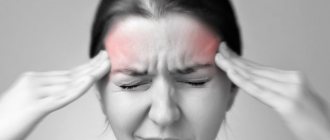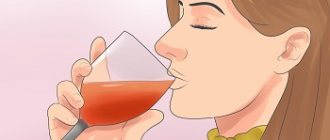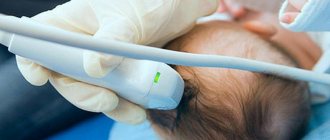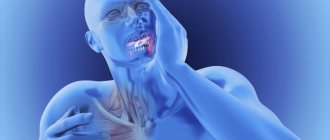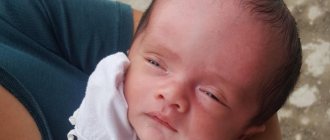Features of headache when coughing
Headaches that accompany a severe cough are often primary, that is, not associated with pathologies of internal organs. They occur directly during a coughing attack or during a period of illness, but disappear after feeling better. They have several features:
- intense, sharp, spreading over the entire surface of the head;
- may have a pulsating character;
- last no more than 2-3 minutes, rarely up to half an hour;
- are not accompanied by additional symptoms (nausea, increased sensitivity to light, etc.).
During a cold or flu, cough of allergic origin, chronic diseases can worsen. So, these diseases can trigger a migraine attack.
Why might there be pain in the head when coughing?
In some cases, the cough radiates to the head in the temple area, and it happens that even a minor bronchial spasm causes the patient to experience severe dull or aching pain in the occipital region. All these unpleasant sensations may indicate the presence of a concomitant disease of the cerebral cortex, which makes itself felt under the influence of the negative factor of lung disease. The causes of pain in the head during coughing can be very diverse. The final and affirmative answer to why a headache suddenly begins to hurt during a bronchial spasm can only be answered by a specialized specialist based on the results of a comprehensive study of the patient’s body and tests that were taken after a visual examination of the patient.
Based on the medical practice of diagnosing such pathologies, doctors put forward the following possible causes::
- Smoking. When nicotine enters the bloodstream, a sharp spasm of blood vessels occurs and an increase in blood pressure. The capillaries of the brain are no exception. They also suffer from this kind of static overload. The consequence of this is slight dizziness when the patient takes the first few breaths of cigarette smoke enriched with nicotine. Simultaneously with vascular spasm during smoking, a dry cough may occur as a natural reaction of the respiratory receptors to smoke entering the lungs.
- Allergy. Each organism reacts differently to the same environmental stimulus. In most cases, an allergic reaction is characterized by inflammation of the mucous membranes of the nasopharynx, eyes and respiratory tract. If a patient’s allergy manifests itself in the form of rhinitis and swelling of the maxillary sinuses, then a side effect of this painful process may be the involvement of muscle fibers that are located in the head area and spasm as a result of mild inflammation. A cough is already a catalyst for pain, since during its manifestation this group of muscles tenses and their involuntary contraction occurs.
- Dependence on atmospheric pressure. There is a certain category of patients whose body reacts very sensitively to changes in atmospheric pressure due to the movement of air masses and the movement of thunderstorm fronts. In such patients, a few hours before the onset of a thunderstorm or other sudden change in weather conditions, a spasm of blood vessels occurs and an increase in blood pressure. Much less common is a hypotonic state, when the patient’s blood pressure drops to a critical value. Then severe dizziness makes it impossible to get out of bed and lead a healthy lifestyle. Along with vascular spasm, a cardiac cough occurs, which, in combination with impaired blood pressure, provokes shooting pains in the head.
- Arnold-Chiari syndrome. This is a congenital pathology of the brain, which is characterized by improper functioning of the cerebellum, which is responsible for coordinating human movements and orientation in open space. It can occur if the mother drank alcohol and smoked tobacco products during pregnancy, or experienced severe intoxication with drugs and medications. The disease is incurable and the patient’s normal health is maintained only by taking medications that directly affect the stabilization of the functioning of this part of the brain. When coughing, this category of patients feels severe pain in the back of the head, which gradually goes away as the bronchial spasm stops.
- Sinusitis. This is an inflammation of the sinuses and ethmoid bones of the facial disc, which can spread to neighboring tissues in close proximity to the cerebral cortex. Then the patient experiences severe pain in the frontal part of the head while coughing. It is possible that nosebleeds may occur due to the destruction of the smallest capillary vessels.
- Cervical neuralgia. This disease causes inflammation of the nerves located in the cervical spine. In this regard, the normal functioning of the peripheral nervous system in this part of the body is disrupted and during coughing, severe shooting pain occurs in the neck, which spreads to the occipital region of the head. During such attacks, patients cannot move and every movement can provoke even more severe headaches. The pain goes away after 5-7 minutes from the onset of the attack.
- Cervical osteochondrosis. Patients with this diagnosis experience discomfort and headache in the back of the head when coughing due to the fact that salt deposition in the cervical discs blocks normal blood circulation and leads to an imbalance of intracranial and blood pressure. It is possible to relieve headache attacks of this type only by treating the underlying problem of their manifestation.
- Oncology. This is the most dangerous cause of attacks of pain in the back of the head, frontal area or temples, which are observed during coughing. A brain tumor takes a very long time to develop and may not make itself felt for a long period of time. One of the signs of its presence is cramping pain in the head, which occurs during static loads on the vessels of the brain. These include coughing, running, swimming, heavy lifting, fast walking, and stressful situations.
During the examination of the patient, each of the indicated possible causes of a painful condition of the head is worked out by a specialist treating the patient.
For this purpose, tests and diagnostic methods are selected according to the principle of systematically excluding each of the possible causes of the disease.
Causes of headaches when coughing
The main reason why headaches occur with respiratory diseases is an increase in blood pressure during coughing. This symptom occurs for a short time as the pressure normalizes between attacks. Another reason is the deterioration of oxygen supply to the brain. This is caused by respiratory failure, swelling of the walls of the respiratory tract. The patient feels weakness, dizziness, deterioration of health and prolonged headaches.
With different types of cough, pain in the head may differ in origin, symptoms and characteristics:
- Colds and flu are common diseases with clear symptoms. They are accompanied by cough, fever, weakness, redness and sore throat. Headaches can be triggered by general intoxication, as well as deterioration of blood supply to the brain.
- Chronic hypertension (main article: Headache with hypertension) is a disease that can worsen during coughing. An increase in blood pressure leads to intense, throbbing pain in the head, deterioration of hearing and vision, and dizziness. The attack can be relieved by using medications to lower blood pressure; it is also important to ensure that the patient rests and has sufficient oxygen access.
- Allergic cough - caused by swelling of the mucous membranes of the respiratory tract in response to an allergen. This leads to the development of respiratory failure and a sharp decrease in oxygen access to the brain. It is important to monitor your health and immediately take an antihistamine - laryngeal edema is life-threatening for the patient.
- Bronchial asthma is a chronic autoimmune disease in which the patient experiences swelling of the walls of the bronchi and lungs. The disease occurs with alternating attacks of exacerbation and remission. The cough is accompanied by dizziness, a sharp deterioration in health, and pressing headaches.
A cough that is accompanied by headaches may be the result of bad habits, especially smoking. It can also be triggered by polluted air, frequent exposure of chemical reagents and bullets to the respiratory tract - these factors cause irritation of the mucous membrane.
Why does a person have a headache when a person coughs a lot - the main reasons
The pain that accompanies a cough can be primary in nature and occur as the body’s response to a cold, or be secondary and indicate a particular pathology. In the first case, the headache is absolutely safe, but secondary pain may indicate serious health problems.
If your cough is accompanied by headaches for a long period of time, you should consult a doctor.
Pain in the head that occurs when coughing is often bilateral, very severe, appears immediately after a sharp cough and goes away immediately after the end of the attack. The average duration of pain ranges from 30 seconds to half an hour. The cause of primary pain lies in the patient’s increased sensitivity to a short-term increase in intracranial pressure that occurs when coughing. These types of pain most often affect middle-aged men.
- Why do my knees hurt after running? What to do if pain occurs when running - some effective tips
The second most common cause of headache during coughing is damage to the peripheral nerve in the cervical region. This disease is called cervical neuralgia. The peculiarity of this pain is that it worsens not only during coughing, but also with sudden movements, turns, and tilting of the head. Most often, the cause of this condition is a draft.
Neuralgia requires consultation with a doctor and proper treatment. This will help avoid meningitis and other dangerous complications.
With cervical osteochondrosis, the discomfort is localized in the back of the head, aggravated by coughing and turning the head. This disease is also characterized by other symptoms, such as dizziness, the development of vegetative-vascular dystonia, and tinnitus. Such symptoms require contacting a neurologist.
The following diseases can also cause headaches when coughing:
- Aneurysm;
- Cyst;
- Oncological pathology of the brain.
A headache that occurs when coughing may indicate the presence of a serious pathology, so a diagnosis is required.
Diagnostic methods
If a cough occurs simultaneously with headaches, it is important to understand its origin. To do this, the doctor will prescribe a set of examinations that will show the full picture of the disease. These may include:
- clinical and biochemical blood tests;
- Dopplerography of the vessels of the neck and brain - ultrasound using a contrast agent;
- blood flow velocity analysis;
- test for allergic and autoimmune diseases;
- MRI of the head – to exclude cysts, neoplasms, aneurysms and other dangerous pathologies.
The Clinical Institute of the Brain has all the conditions for quick and high-quality diagnosis of diseases that are accompanied by cough and headache. There is modern, highly sensitive equipment here - its use guarantees the most accurate result.
Treatment of headaches and cough
Treatment is aimed at eliminating the main symptoms of the disease and additional signs. Methods are selected individually, depending on the exact diagnosis and individual characteristics. So, the doctor may prescribe the following treatment methods:
- antibiotic therapy – effective for bacterial diseases of the respiratory tract;
- antiviral agents, vitamins and restoratives for colds;
- specific treatment for allergic and autoimmune diseases;
- a set of techniques to lower blood pressure.
Treatment at the Clinical Brain Institute is an individual scheme, which is selected based on diagnostic results. Our center has all the conditions for inpatient and outpatient treatment. The process takes place under the supervision of experienced doctors - specialists of a wide and narrow profile.
Prevention methods
To prevent colds, acute respiratory viral infections and flu, it is important to follow general recommendations to strengthen the immune system. It is useful to spend a lot of time outdoors, engage in moderate physical activity, and take vitamins during the cold season. Doctors also recommend monitoring blood pressure levels.
The Clinical Brain Institute specializes in the diagnosis and treatment of diseases that are accompanied by headaches. Experienced doctors will select a medication regimen to reduce cough, relieve headaches and other symptoms. It is important to follow all recommendations at home, not skip medications and follow additional prescriptions.
Clinical Brain Institute Rating: 5/5 — 1 votes
Share article on social networks
How to get rid of pain in the temples and head from coughing?
In order to quickly get rid of severe pain in the temples during a coughing attack at home, you need to take a painkiller. For these purposes, drugs such as Tempalgin, Aspirin, Analgin, Panadol, Solpadeine, Paracetamol, Codeine are suitable. These are powerful medications that block the sensitivity of certain areas of the brain responsible for the perception of pain.
Of course, before taking these medications, you need to make sure that the pain in the temples is not caused by a sharp rise in blood pressure. Otherwise, the pain syndrome can be relieved, but the spasm of blood vessels will remain at the same level, and this is fraught with the development of ischemic stroke of the brain, which in 75% of cases leads to loss of ability to work and disability.

